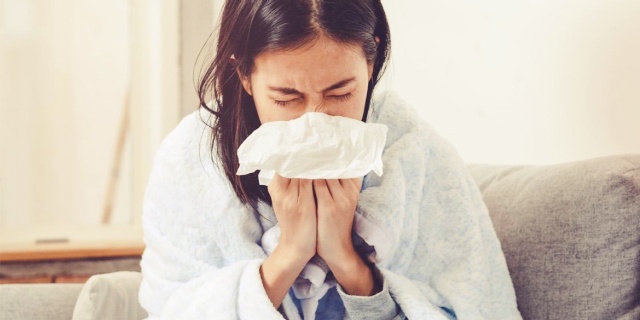
As we transition into the warmer months, it's easy to get caught off guard by sudden weather changes. One day might feel like summer, while the next brings unexpected rain. Dressing for the sunshine only to be drenched by an unanticipated downpour can quickly lead to a cold. That's why it's essential to understand how to prevent the common cold before it strikes. In this article, we'll explore practical ways to stay healthy and answer a key seasonal question: What helps relieve cold symptoms?
WARNING: This content is for informational purposes only and is not intended to provide medical advice. {alertError}
How to Prevent the Common Cold During Seasonal Changes

If your immune system isn't in top shape during seasonal changes, you're more likely to fall ill. Cold symptoms can hit hard and fast—runny nose, headaches, fever, nasal congestion, muscle and joint pain, fatigue. But there are ways to build your defenses before the virus strikes. Here’s how:
SEE ALSO: Understanding Canker Sores: A Complete Guide to Causes, Treatment, and Prevention
Start Your Day with a Nutritious Breakfast
Breakfast is the most important meal when it comes to building resilience. A balanced, healthy breakfast every day boosts your immune system. Make sure to include:
SEE ALSO: Hydration Matters: How to Make Drinking Water a Daily Habit
- Fresh cucumbers and tomatoes
- Low-fat cheese
- Citrus juices like orange or tangerine, rich in vitamin C
- Natural, unsweetened foods
- Plenty of leafy greens
Dress for the Weather, Not Just the Sun
It’s easy to be fooled by warm spring sunshine, but weather can shift quickly. Wearing short sleeves on a breezy day may open the door to illness.
SEE ALSO: How Cold Weather Affects the Body: The Hidden Effects on Health and Mood
Always check the forecast and dress in layers if needed. Don’t rely on appearances—spring is known for its unpredictable swings.
Prioritize Hygiene
To avoid catching a cold or flu, personal hygiene is critical:
- Wash your hands regularly
- Keep feet clean and dry
- Shower consistently
- Be mindful of physical contact, especially during high-risk seasons
Germs thrive in public spaces. If someone near you is ill, try to keep a respectful distance.
Use Air Conditioning and Fans Wisely
As temperatures rise, air conditioners and fans become our best friends—but they can also be sneaky culprits behind colds.
SEE ALSO: The Complete Guide to the Benefits of Running
Never sit in front of a fan or AC unit while sweaty. This sudden drop in body temperature weakens your defenses. Always change out of damp clothing after sweating.
Get Enough Rest
Quality sleep is one of your best defenses. A well-rested body is better equipped to fight viruses. Lack of sleep can weaken the immune system and make you more susceptible.
SEE ALSO: 5 Practical Tips to Protect Your Eye Health
A regular sleep schedule helps you stay alert, sharp, and protected.
Don’t Skip Physical Activity
Regular exercise keeps your body energized and strong. It helps flush out fatigue and prepares your body to fight off infections.
SEE ALSO: What Helps with Constipation? 6 Key Tips for Fast and Natural Relief
Even light workouts can make a difference. If you're feeling rundown, gentle exercise paired with proper nutrition can help you bounce back quicker.
Load Up on Vitamins
One of the easiest and most effective ways to strengthen your immune system is through vitamin-rich foods. Vitamin C, iron, and other essential nutrients play a key role in fighting off colds.
If you often skip meals or lack variety in your diet, your body becomes more vulnerable. Ensure you're getting the right nutrients daily to stay protected—even if you do catch a cold, your recovery will be smoother.
Avoid Cold Beverages
Tempted by cold drinks as the weather warms up? You're not alone. But until summer fully settles in, icy drinks can irritate your throat and nasal passages, increasing the risk of infection.
Try to limit your intake of cold water, ice cream, and chilled coffee or tea during transitional seasons.
While it might be impossible to avoid colds entirely, learning how to prevent the common cold can significantly reduce your chances of getting sick. If you do happen to catch a cold, following these simple habits will help you recover more quickly and feel stronger.
Focus on your nutrition, keep moving, and maintain a consistent sleep routine—that’s how to prevent the common cold and enjoy a healthy, vibrant season ahead!